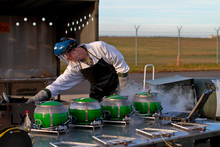Q: I want to schedule a job by meter reading in MainBoss Advanced. What's the best approach?
A: First, you need to create a meter class for the type of meter that will be involved. This means telling MainBoss what kind of meter it is; most importantly, you specify the units of measurement that the meter uses. For example, you might have a meter class for meters that measure "by the hour" or "by the mile".
Next, you need to create a meter record of the appropriate class. This meter should be associated with the appropriate unit. For example, suppose a car needs an oil change every 3000 miles. Then the unit record for the car should have a "by the mile" meter record that you use to record odometer readings.
When you create a new meter record, MainBoss automatically creates an initial meter reading record for the meter. This record uses today's date (i.e the date when you create the meter record) with a meter value of zero. This default reading is fine for brand new units; however, if a unit has actually been in operation for some time, you should delete the "zero" meter reading and create a new meter reading that records the actual meter value as of a particular date.
It's important to delete the "zero" meter reading before you enter an actual reading for the meter.
Otherwise, you will get incorrect results.
For example, suppose your car's odometer reads 1000 miles on June 1 and on June 2, you create a new meter record
for the car's odometer.
Immediately, MainBoss creates a "zero" record for the meter, dated June 2.
If you then create a meter reading saying the meter read 1000 on June 1, it looks like the meter went down by 1000
between June 1 and June 2, so MainBoss issues an error.
On the other hand, if you try to fudge things and say that the 1000 reading was taken June 2 after the zero reading,
then MainBoss thinks the meter went from 0 to 1000 in a very short period of time, and will therefore make incorrect
estimates of how fast the meter actually goes up.
To avoid such problems, delete the "zero" reading and then enter a "real" reading.
Once you have created an appropriate meter record and entered a correct meter reading for that meter, you're ready to create a unit maintenance plan for the unit. For example, let's go back to that car that needs an oil change every 3000 miles. The unit maintenance plan consists of three major pieces of information:
- The unit involved (in this case, the car)
- The task that must be done (in this case, a description of the oil change)
- The timing for the task (in this case, every 3000 miles)
After you have created the unit maintenance plan, there's one more important step: setting the schedule basis. This basically tells MainBoss the last time you performed the job on the unit. For example, you would tell MainBoss the last time you performed an oil change on the car, so that MainBoss can figure out when the next time should be.
For best results, we strongly recommend that you enter a meter reading for the date/time when you performed the previous maintenance job. For example, if the last time this car got an oil change was May 1, we strongly recommend that you enter a meter reading for that date. (If you don't have an exact reading, a reasonable estimate is better than nothing.) If you give MainBoss a date/time that doesn't have an associated meter reading, MainBoss has to make a guess...and since this is a new unit, MainBoss probably doesn't have enough data to make a good estimate. MainBoss won't be able to make good estimates until it has enough meter readings to establish a consistent pattern of use.




